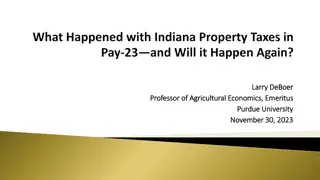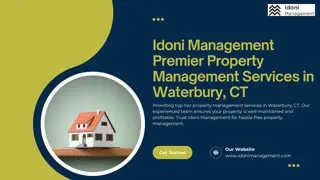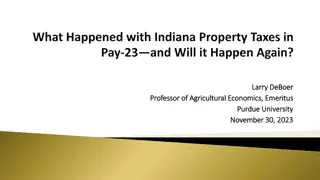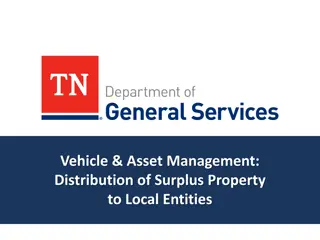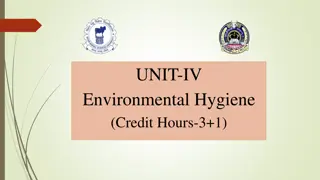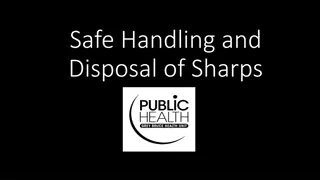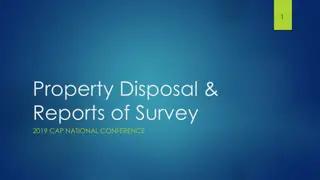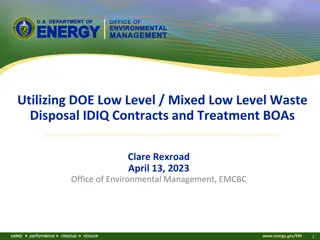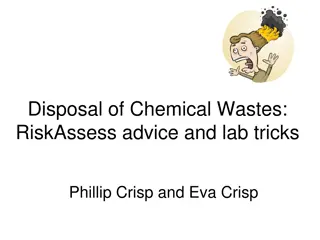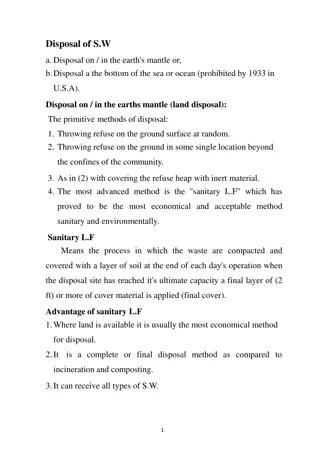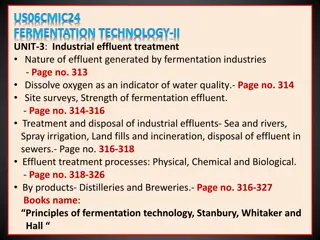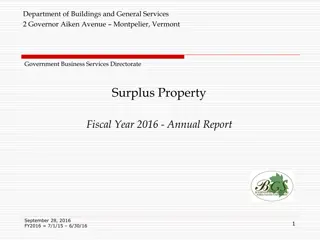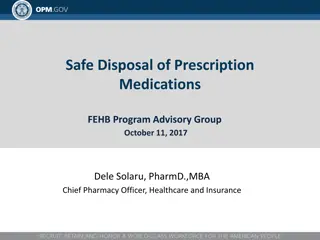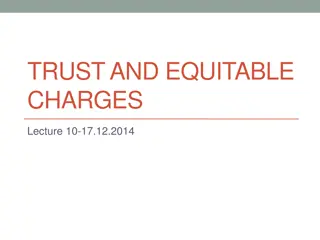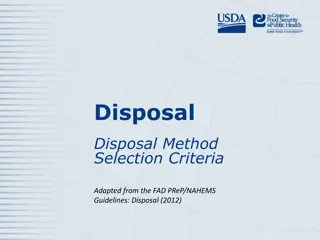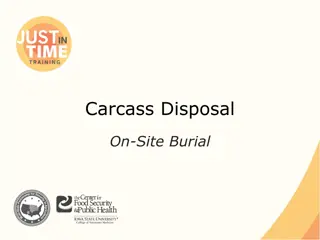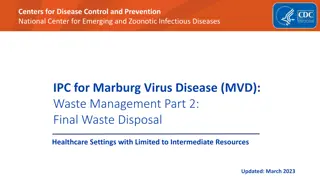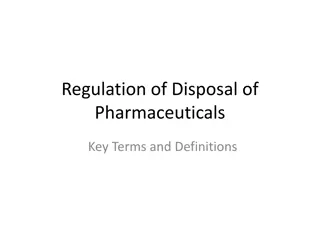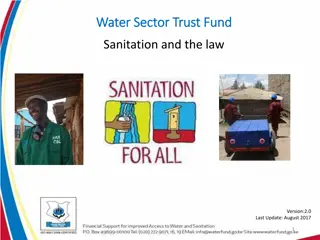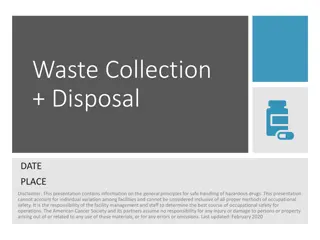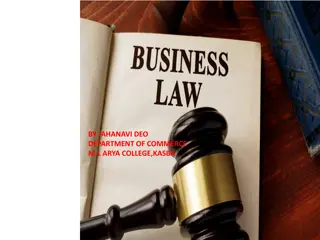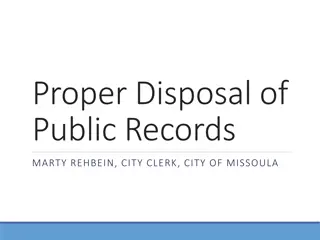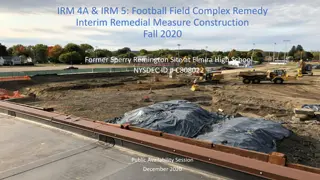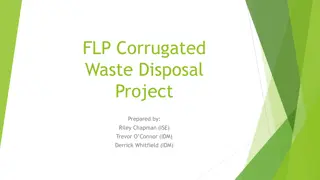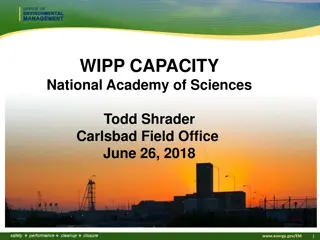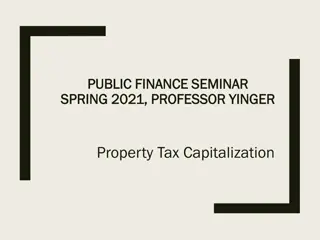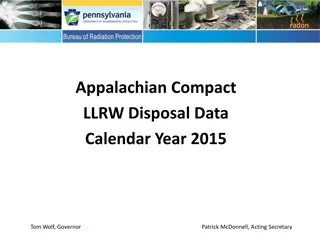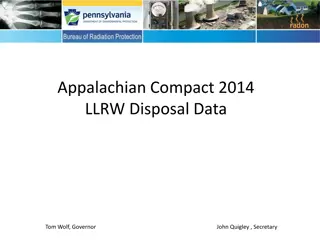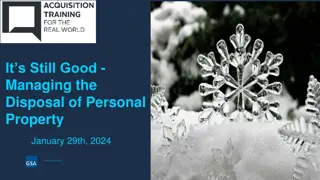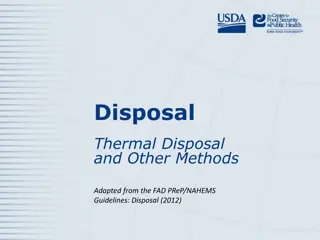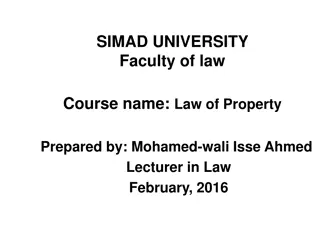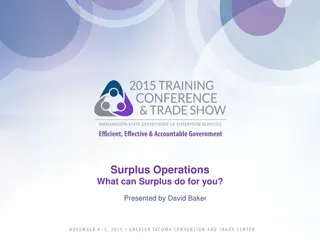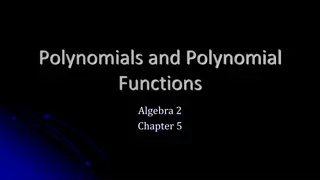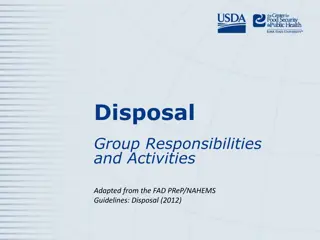Evolution of Property Transfer in Roman Law
Comparative Property Law explores the evolution of property transfer in Roman law. In classical Roman law, property transfer required an external act of delivery. Over time, formal acts like mancipatio and traditio became common for property transfer. During the Justinian period, traditio became the
3 views • 24 slides
Property Settlements in Family Law: Case Study of Stamatou & Stamatou [2022] FedCFamC1F 241
In the legal case of Stamatou & Stamatou [2022], a property settlement was determined with a declaration that the husband's parents held the property for the benefit of the husband and wife. The court divided the property 60% to the wife and 40% to the husband based on contributions and various fact
0 views • 27 slides
Property Tax Trends in Indiana: A Historical Overview
The data presented showcases the evolution of property tax trends in Indiana from 1972 to 2023, highlighting Indiana's position in terms of median homeowner property taxes, property tax revenue as a percentage of state income, and comparisons with neighboring states. Indiana shows a significant redu
2 views • 43 slides
One of the Best service for Property Sales in Finchley
Aaron Shohet Property provides the Best service for Property Sales in Finchley. Their comprehensive services include property management, property valuations, and property sales and lettings. Whether you're looking to buy, sell, or rent property in the Millbrook Park area, their dedicated team is he
0 views • 6 slides
Comprehensive Property Management Services in Waterbury, CT by Idoni Management
Explore the comprehensive property management services offered by Idoni Management in Waterbury, CT. Our expert team provides tailored solutions for property owners, including tenant screening, rent collection, property maintenance, financial reporting, and lease management. Discover why we are the
1 views • 10 slides
Property Tax Trends in Indiana: A Comparative Analysis
Indiana's property tax landscape is examined through the lens of median homeowner property taxes, property tax revenue as a percentage of state income, and historical trends dating back to 1972. The state's ranking in terms of property tax burden, relative to other states, is highlighted, showcasing
0 views • 43 slides
Vehicle & Asset Management: Surplus Property Distribution to Local Entities
The Surplus Property Program, operated by General Services, manages the redistribution of surplus property purchased with state funding to various entities such as state agencies, local governments, and non-profit organizations. Additionally, the Federal Excess/Surplus Property Program oversees the
0 views • 16 slides
Ensuring Hygienic Disposal of Carcasses and Fallen Animals
Disposing of carcasses and fallen animals is a crucial responsibility for veterinarians to maintain environmental hygiene and prevent health risks. Improper disposal can lead to the spread of diseases and attract pests. Various methods, such as burial, cremation, and incineration, are used to ensure
0 views • 22 slides
Proper Handling and Disposal of Sharps - A Community Safety Concern
Improper disposal of sharps poses risks to public safety as it can lead to injuries from needles contaminated with blood-borne infections. This article emphasizes the importance of safe handling and disposal practices for sharps, including drug paraphernalia, to protect both individuals and the comm
0 views • 21 slides
Property Disposal & Reports of Survey Guidelines at 2019 CAP National Conference
Guidelines for proper disposal of property and conducting reports of survey at the 2019 CAP National Conference. Discusses disposing property, capitalization of fixed assets, and the process of conducting reports of survey in the CAP organization.
0 views • 14 slides
Utilizing DOE Low-Level & Mixed Low-Level Waste Disposal Contracts
EMCBC manages disposal and treatment contracts for Low-Level Waste (LLW) & Mixed Low-Level Waste (MLLW). Eligible users include DOE offices, prime contractors, and subcontractors. Services cover various waste types including radioactive materials, sealed sources, and TSCA-regulated waste. Specific c
0 views • 19 slides
Understanding Income from House Property in Taxation
House property income refers to rent received from properties owned by an individual, charged under income tax. It is based on the concept of annual value, representing the expected rental income or market value of the property. The annual value is taxable under the head "Income from House Property.
1 views • 12 slides
Proper Chemical Waste Disposal: Advice and Best Practices
Learn how to safely dispose of chemical wastes in compliance with local regulations. Follow expert advice on waste collection, avoid sewer and garbage disposal, and prioritize safety to minimize environmental harm. Training on responsible disposal practices is essential for creating a culture of sus
0 views • 18 slides
Understanding Income from House Property
Income from house property is calculated based on the annual value of the property's income-generating potential. Certain conditions must be met for the property income to be taxable, such as the property consisting of buildings and lands appurtenant thereto and the owner not using it for business p
4 views • 20 slides
Efficient Methods and Considerations for Solid Waste Disposal
Efficient methods for solid waste disposal include sanitary landfilling, which involves compacting waste and covering it with soil daily. Advantages of this method include economic viability and flexibility in waste disposal. However, challenges such as limited suitable land availability and potenti
0 views • 10 slides
Industrial Effluent Treatment in Fermentation Industries
Fermentation industries generate various types of effluent containing organic matter, solids, and other waste materials. With stricter regulations on waste disposal, efficient treatment methods are essential for controlled disposal. This includes physical, chemical, and biological processes to treat
0 views • 84 slides
Department of Buildings and General Services Surplus Property Program Overview
The Department of Buildings and General Services in Vermont manages the redistribution and disposal of surplus state and federal property. Their mission is to facilitate the transfer of surplus property to state agencies, municipalities, nonprofits, and the public in a cost-effective manner. The pro
0 views • 62 slides
Safe Disposal of Prescription Medications: Importance and Methods
Proper disposal of prescription medications is crucial to prevent harm to children, pets, and the environment. Safely dispose of unused medications to avoid accidental poisoning, misuse, and pollution of water sources. Methods include using authorized collectors, pharmacies, and take-back events, an
0 views • 5 slides
Understanding Trust and Equitable Charges in Property Law
Trust and equitable charges in property law involve a legal obligation where the property holder manages the property for the benefit of another person. This trust relationship consists of elements like legal title, trust property, and beneficiaries. The creators of a trust can be referred to as set
0 views • 25 slides
Guidelines for Animal Disposal Methods
Environmental and biosecurity guidelines recommend various disposal methods such as composting, rendering, permitted landfill, unlined burial, fixed-facility incineration, and open-air burning. Each method has specific selection criteria and considerations to minimize risks to the environment and bi
0 views • 17 slides
On-Site Burial for Carcass Disposal: Methods and Environmental Impacts
Explore the process of carcass disposal through on-site burial, covering topics such as trench burial, site selection, construction and design considerations, environmental impacts, and a comparison with other disposal methods. Learn about key factors influencing on-site burial, including soil prope
0 views • 13 slides
Proper Waste Disposal in Healthcare Settings for Marburg Virus Disease
In healthcare settings, proper waste disposal is crucial during outbreaks like Marburg virus disease to prevent health risks for patients, staff, and the community. This involves incineration or non-burn treatment of infectious waste before disposal, emphasizing the importance of appropriate waste m
0 views • 16 slides
Regulations and Disposal of Pharmaceuticals Key Terms
Understanding the regulations around the disposal of pharmaceuticals is crucial to protect the environment and ensure safe practices. Unwanted pharmaceuticals should not be disposed of with regular trash or flushed as they can affect water resources. Incineration, governed by federal Clean Air Act r
0 views • 7 slides
Waste Disposal Regulations and Guidelines for Sanitation
Guidelines for waste disposal and sanitation laws under the Public Health Act are outlined, including definitions of nuisances, prohibitions, penalties, and training programs for sanitation teams. Failure to comply with regulations can result in fines. Proper waste handling and disposal are essentia
0 views • 8 slides
Proper Handling and Disposal of Hazardous Drugs and Waste
Guidelines for the safe handling and disposal of hazardous drugs and waste in healthcare facilities. The content covers training modules, waste collection, sources of healthcare waste, disposal methods, and legal regulations related to the disposal of hazardous drugs. Various types of healthcare was
0 views • 21 slides
Understanding the Effects of Contract on Goods Approval and Property Rights
Explore the effects of contract on goods approval, property rights, and risk transfer between buyers and sellers. Learn about passing of property, reservation of right of disposal, and risk associated with goods until transfer of ownership. Understand the significance of buyer's approval and accepta
0 views • 4 slides
Proper Disposal of Public Records Guidelines in Montana
Guidelines for proper management and disposal of public records in local government entities in Montana, outlined under HB 123 passed in 2015. The Local Government Records Committee (LGRC) oversees records retention schedules and reviews disposal requests. Contact LGRC for questions or assistance re
0 views • 24 slides
Football Field Complex Remedy Project Overview
The project involves remedial measures for the football field complex at Elmira High School, focusing on soil removal, groundwater monitoring, and vapor intrusion prevention. Excavation, disposal of hazardous waste, and construction of institutional controls are key components. Plans for interim rem
0 views • 15 slides
FLP Corrugated Waste Disposal Project Overview
This project aims to improve the efficiency and cost-effectiveness of the current corrugated waste disposal process. By implementing alternative designs and reengineering processes, the goal is to increase labor efficiency by 10%, reduce waste disposal costs by 10%, and provide recommendations for s
0 views • 8 slides
WIPP Waste Disposal Capacity Overview
The Waste Isolation Pilot Plant (WIPP) has a statutory capacity of up to 175,565 cubic meters for disposal of transuranic waste. As of June 2018, 93,500 cubic meters of TRU waste have been emplaced at WIPP. The facility operates within the 16 square mile land withdrawal boundary specified by the WIP
0 views • 8 slides
Understanding Property Tax Capitalization in Public Finance
Explore the concept of property tax capitalization, its implications for public policy, and how it impacts property value. Learn how property taxes influence housing prices and the valuation of assets, and delve into the relationship between property taxes and the value of housing services. Discover
0 views • 50 slides
Disposal Data of Appalachian Compact LLRW 2015
The data from the Appalachian Compact LLRW disposal activities in the year 2015 includes information on disposed volume and activity by state and facility type. Figures show cubic feet and curies disposed, detailing academic, government, industry, medical, and utility sectors. The disposal sites wer
0 views • 12 slides
Appalachian Compact 2014 LLRW Disposal Data Analysis
This data analysis showcases the disposed low-level radioactive waste (LLRW) volumes, activities, and trends as part of the Appalachian Compact in 2014. It provides insights into LLRW disposal by state, facility type, and activity levels, covering academic, government, industry, medical, and utility
0 views • 10 slides
Proper Management of Personal Property Disposal Process
Explore the steps involved in managing the disposal of personal property efficiently, including internal screening, excess screening, and utilizing resources like PPMS and NUOs. Learn about the various methods of disposal such as transfer, donation, and public auction. Discover how to identify if yo
0 views • 47 slides
Thermal Disposal Methods for Animal Carcasses: Guidelines and Best Practices
Explore thermal disposal methods adapted from the FAD PReP/NAHEMS Guidelines for effectively managing animal carcasses. Learn about high-temperature combustion, fixed-facility incineration, open-air burning risks, and air-curtain incineration techniques. These methods vary in efficiency, environment
0 views • 17 slides
Understanding the Law of Property: Concepts and Rights
This material explores the fundamental concepts of the Law of Property, covering topics such as the concept of patrimony, property rights, and the objects of property. It delves into the origins and legal implications of patrimonial and extra-patrimonial rights, shedding light on the significance of
0 views • 40 slides
Surplus Operations: How We Help Agencies Manage Property Efficiently
Surplus Operations, presented by David Baker, offers property management services to agencies including state and local governments, municipalities, school districts, and non-profits. Their mission is to recover, reuse, or recycle property to avoid disposal, saving money for agency partners. Service
0 views • 34 slides
Understanding Properties of Exponents in Algebra
Explore the properties of exponents in algebra to simplify expressions and work with scientific notation efficiently. Learn about the zero exponent property, negative exponent property, product property, power of a product property, power of a power property, quotient property, and how to use these
0 views • 66 slides
Guidelines for Disposal Group Responsibilities and Activities
Responsibilities and activities of the disposal group adapted from FAD PReP/NAHEMS guidelines include roles such as disposal method recommendations, organizing and directing activities, ensuring procedures are carried out, and performing disposal tasks. The group aims to mitigate pathogen spread, sa
0 views • 16 slides
Top Tips for a Smooth Garbage Disposal Installation in San Diego
Installing a garbage disposal can be a simple yet effective home improvement activity for your kitchen. With the disposal, you save your kitchen from trash while at the same time ensure proper clean-up after meals. Contact us now.\nFor more info - \n
0 views • 5 slides

![Property Settlements in Family Law: Case Study of Stamatou & Stamatou [2022] FedCFamC1F 241](/thumb/63303/property-settlements-in-family-law-case-study-of-stamatou-stamatou-2022-fedcfamc1f-241.jpg)
